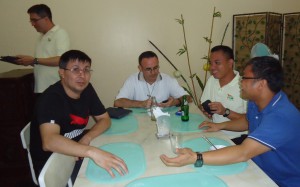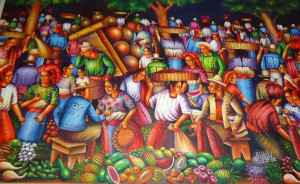A commentary on Mk 6, 30-34 (XVI Sunday, O.T. July 19th 2015)
We read today five verses from Mark’s chapter six, verses that are a transition between two big stories: the martyrdom of John the Baptist (a painful experience for the disciples and for Jesus himself) and the multiplication of bread (a clear sign of a God that sustains his humble people in the desert).
Theses verses are a transition text, but not for that less meaningful. In fact, the text is full up with deep and clear feelings in two directions: the community of disciples and the crowd looking for a better life quality. In Jesus we can contemplate a double movement, similar to the double movement of the physical heart, from the community to the crowd and back. As it happens with the physical heart, the same happens with community and mission: one movement cannot be without the other, community and mission go together. Let us meditate for a while on those two concrete movements of love:
- Tenderness towards the members of the community
Mark tells us about the way Jesus receives the disciples returning from the mission: he welcomes them, listens to their stories and invites them to rest, as he used to do in Bethany.
Maybe you remember a fil by Pier Paolo Pasolini, some time ago, on the gospel according to Matthew. It was a very interesting and moving film, but –if I remember it properly- in it Jesus was a prophet quite severe, with a long face and severe words… Certainly, Jesus was quite clear in his denouncing a false religiosity. But what we read today shows us another Jesus: tender, welcoming, giving attention to the needs of his disciples. This is a human attitude that I feel we need so much in our everyday life: in the family, in the Christian community, in the apostolic group. Quite often we wish so much to do well, we try to be so perfect, we wish the best for our family or our Church. So much so that we risk becoming hypercritical, intolerant, angry, negative… Let us pray that we imitate Jesus and learn from him this tenderness that makes us able to be welcoming to people near us and to care for one another.
2.- Sensible to the needs of the crowd
The attention to the small group of people near him does not make Jesus indifferent to the need of the crowd; rather it’s the opposite: together with the community he becomes more sensible to the needs of the crowd of people that are like sheep with no shepherd; they are hungry of bread, understanding, love… The attitude of Jesus has been imitated by so many disciples, among which Daniel Comboni, who arriving at Khartoum (Africa) said to the people: “I want to make common cause with each one of you”.
Before so many people that today, as in the times of Jesus, are looking for a better health, a better and more just food, a real dignity, a sense of life, real love, the answer of the disciple missionary it’s not indifference, it’s not look away, but to “make common cause”, to share the problems ,expectation and possible solutions. This making common cause will give way to many initiatives of solidarity, but the first thing is not to be indifferent, to allow the situation touch our heart, to move our feelings, to share with the people; from that sharing will come out our concrete help, knowing that if everyone does its best, the miracle of brotherhood will take place.
Fr. Antonio Villarino
Roma





